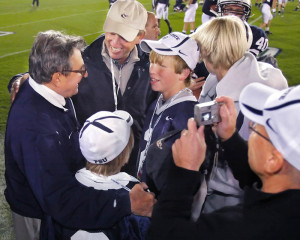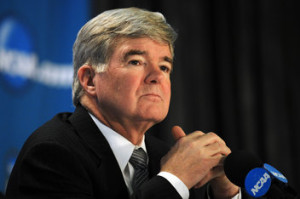The National Collegiate Athletic Association (NCAA) is currently fighting battles in the court system that have a major weight for its future structure.
 (Joe) Paterno family et al. vs. NCAA:
(Joe) Paterno family et al. vs. NCAA:
Issues: To briefly summarize the lawsuit that can be read in its entirety here, the Paterno family and former members of Penn State University are suing the NCAA for the unprecedented sanctions placed on Penn State University after the astonishing Jerry Sandusky scandal was revealed. The lawsuit goes on to assert that the NCAA overstepped its scope of authority because the scandal “did not violate the NCAA’s rules and was unrelated to any athletics issue the NCAA could permissibly regulate.” Therefore, the NCAA’s disregard for its authority violated its duties of good faith and fair dealing, which “intentionally and tortiously interfered” with Joe Paterno’s contractual relations (as he was later fired), as well as “defamed and commercially disparaged” Paterno and other plaintiffs.
Analysis: Typically, when an institution has violated an NCAA bylaw, that institution may be punished through various manners including, but not limited to: vacated wins, reduced scholarships, or no post-season competition. In this situation, Penn State entered into a consent decree with the NCAA which allowed for the intense sanctions that were placed on Penn State University and fellow members whom were involved in the criminal scandal lead by Jerry Sandusky. The lawsuit filed alleges that the President of Penn State, Rodney Erickson, was forced to sign the agreed judgment; otherwise the NCAA would have imposed the death penalty against the football program. This death penalty would have been similar to the death penalty imposed on the Southern Methodist University football program in 1987, which hampered the programs ability to become an elite program again. Robert Wheel of SB Nation makes a compelling argument for the NCAA in his article here. Wheel points out that because of privity of contract, the Paterno family will most likely have their lawsuit dismissed, unless it is amended to include the Penn State and its President who signed the consent decree. The lawsuit is likely to be dismissed because the NCAA, Penn State and Erickson, none of which include any of the Plaintiffs, agreed to the consent decree. It has yet to be determined if or when the plaintiffs will amend the lawsuit, but an amended lawsuit could be used as leverage to settle.
Conclusion: I presume that the Paterno family and other Plaintiffs will amend the complaint to include Penn State and Rodney Erickson. Ultimately, the NCAA will attempt to dismiss this lawsuit, however if that fails, it may be best for the NCAA and Penn State to attempt to settle this case before it is subjected to similar national publicity as the O’Bannon et al. v. NCAA lawsuit that is currently in the spotlight. Whatever the outcome of this case is, it will help establish the precedent for authority the NCAA has when it wants to sanction institutions for criminal offenses that are not directly impermissible within the NCAA bylaws.

Ed O’Bannon v. NCAA and Electronic Arts (EA)
Issues: Former UCLA basketball star, Ed O’Bannon is the face of the class action lawsuit that includes current NCAA student-athletes as well as NBA legends, Oscar Robinson and Kareem Abdul-Jabbar. The most recent amended lawsuit that includes current student-athletes states that the NCAA and EA used and continue to use the likeness of current and former student-athletes to gain profits without giving just compensation to those student-athletes. This antitrust lawsuit seeks to share the royalty payments for former and current football and men’s basketball student-athletes as well as providing student-athletes the ability to establish their own licensing deals in the future.
Analysis: Currently, this lawsuit is awaiting for the judgment of U.S. District Judge Claudia Wilken to issue her order from the hearing that happened on July 18, 2013 on whether the plaintiffs in the lawsuit should be certified as a class or not. As Sports Illustrated writer, Michael McCann states in his recent article, the judgment from Judge Wilken will not decide the entire case, but it will determine three outcomes. McCann states the first outcome would favor the NCAA if Judge Wilken denies certification of the class, which will break up the plaintiffs and force them to sue the NCAA individually. This outcome will take years to get sorted out and clog our already clogged court system. The second outcome could be seen as a tie between both parties since a partial grant and partial deny of the certification will allow former student-athletes to sue the NCAA together, but current student-athletes will not be allowed to participate within the suits. The final outcome will allow Ed O’Bannon and other named plaintiffs to sue on behalf of all current and former student-athletes, which would prove most favorable to the plaintiffs. The outcome of the class certification issue could sway the result of this long battle.
Conclusion: Currently, this case is on track to go to trial some time in June 2014. Judge Wilken’s order for the class certification will determine who has the leverage going forth. Unless the class certification order is entirely denied by the judge, I believe that this battle will settle before it goes to trial next June. Two reasons why: First, if the NCAA goes to trial and loses, it could face paying current and former student-athletes billions of dollars in damages. Second, a settlement for these claims will set precedent that may favor the NCAA if the plaintiffs decide to sue the NCAA for their television revenue as well (which is viable). No matter what, this case will help shape the future of what college athletics looks like including the ability to pay student-athletes for their likeness, which will influence the structure of profitable and non-profitable sport programs, as well as have Title IV implications.
Comment below, like Sports Networker on Facebook and follow us on Twitter @SportsNetworker


